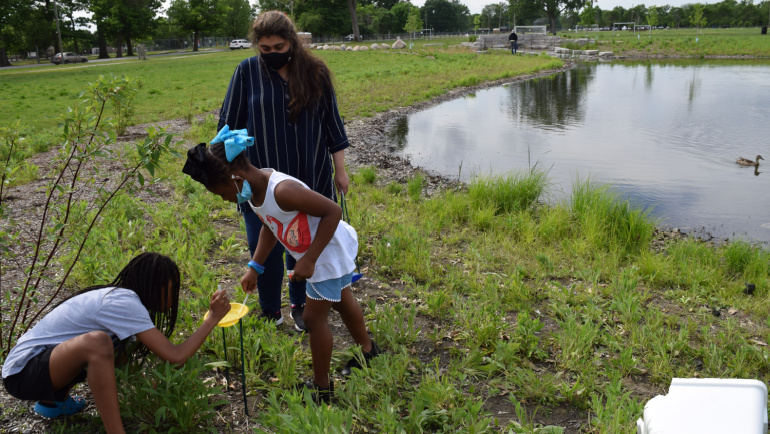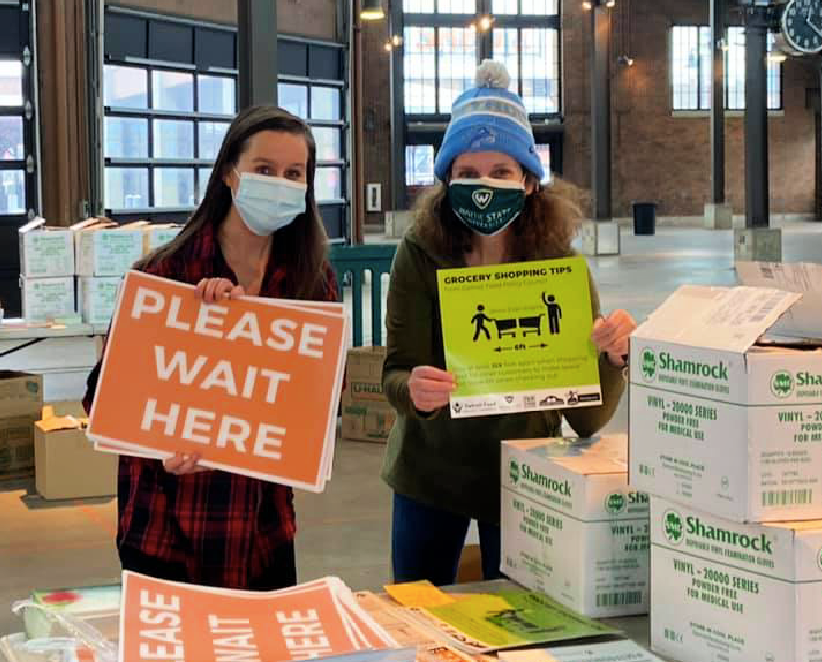
An impressive four of 10 Ford College Community Challenge annual grants were awarded to Wayne State University students in early September 2021 for projects that will advance sustainability and community wellness in neighborhoods across greater Detroit. The remaining six awardees were Harvard University, Michigan State University, Ohio State University (2) and Rutgers University. The Ford Motor Company Fund awards up to $25,000 for each winning project.
“Ford Fund is proud to work with Wayne State University to empower college students to be a powerful force for good in the world,” said Mike Schmidt, Ford Fund’s Director, Education and Global Community Development. “As one of the first universities to participate in the Ford College Community Challenge in 2008, it is exciting to how the challenge has expanded across WSU and continues to help students create sustainable social enterprises that drive positive change.”
The number of Ford College Community Challenge awards underscores Wayne State’s commitment to promoting environmentally sustainable, healthy communities. Since 2008, college students have competed nationally for the Ford Fund awards, which invite students to develop ideas for innovative projects that address community needs.
Professor Donna Kashian, director of environmental sciences at the College of Liberal Arts and Sciences, is a faculty mentor for students on two of the winning projects — green stormwater infrastructure (GSI) systems in Pontiac and at the Chandler Park Conservancy. “We are grateful that the Ford Fund selected four Wayne State projects for College Community Challenge grants,” said Kashian. “It has been exciting to watch teams of students come together to address urban sustainability issues and recognize the value and importance of working with community partners and incorporating community education programs.”
2021 Ford College Community Challenge winning projects
Canfield Connect: Pedestrian Greenway
The Canfield Connect project will expand on the efforts of the Canfield Consortium, a nonprofit organization that works to restore vital community experiences and combat blight in East Canfield Village, Detroit. Student project leaders Abigail Newland, an Accelerated Graduate Enrollment (AGRADE) student in public administration, and Juno Mcmillon, a master of public administration (M.P.A.) student, will guide their team to create a safe pedestrian greenway through currently vacant alleys and lots, connecting the Detroit East Canfield neighborhood from nearby Brewer Playfield to Pingree Park.
“We are immensely grateful to the Ford Motor Company Fund for selecting our project, along with our fellow Wayne State teams, and we are excited to serve Detroit communities as public administration students,” said Newland. “We are certain that this grant will help us provide a great beginning to the Canfield Connect project in East Canfield Village.”
Improving neighborhood walkability and increasing access to recreational spaces are among the benefits of the project. Partnering with the Canfield Consortium, students will seek input from the community before they create the green community trail, which will feature native plants that prevent flooding. “We are so excited that the Canfield Connect project was chosen by the Ford Fund, and we look forward to engaging the community and working with students from Wayne State University to activate vacant lots in a unique way,” said Kim Theus, Canfield Consortium co-founder.
Chandler Park Conservancy: Green Stormwater Infrastructure (GSI)
Wayne State students from the Detroit Biodiversity Network (DBN), Healthy Urban Waters (HUW), and the Transformative Research in Urban Sustainability and Training (T-RUST) program will work with the Chandler Park Conservancy to install and monitor groundwater wells at several GSI sites. DBN and HUW student project leader Dimitrios Kakaris said the project will continue the effort to re-green the Chandler Park community and improve the health of the environment and its residents, by providing knowledge and expertise to the neighborhood residents.
“While many of these projects have been installed, there will be a continued need for stewardship of the land by managing these sites. This is best done by providing the community groups interested with the tools and knowledge to do so,” said Kakaris. “The goal of this project is to make GSI sustainable by educating community leaders to pass on their knowledge to the next generation, and to create a local system of environmental education and management.”
Students will work with the Chandler Park Conservancy to install a gabion retaining wall, provide additional native plants, train volunteers to collect, treat and plant seed for future needs, and assist in the new community garden.
Great Grocer Project: Employee Wellness Initiative

Working with the nonprofit Detroit Food Policy Council (DFPC) and its working group, the Detroit Grocery Coalition (DGC), students from the community health program in the Wayne State College of Education and faculty members from the Center for Health and Community Impact will implement a new employee wellness initiative at independently owned grocery stores throughout Detroit. The project expands on the Great Grocer Project — a community-based initiative launched in March 2021 to promote these local grocery stores, increase awareness and sales of healthy foods, and boost economic vitality in Detroit neighborhoods.
“Grocery store employees in Detroit have faced significant stressors and other related health issues, caused by the pandemic and the events of 2020. Often, grocery store employees are low-wage, part-time workers who have limited access to health and wellness services. This project will promote equitable policies, systems and environments for grocery store employees, for greater productivity and overall wellness within Detroit grocers,” said Assistant Professor Rachael Dombrowski, who jointly directs the Great Grocer Project. Dombrowski, student project leader Bree Bode, the DFPC, the DGC and other members of the project team will give employees at more than 25 independently owned grocery stores access to a workplace wellness program that includes nutrition, physical activity, stress management and a health screening.
The team is thankful for the Ford Fund award, which will support communities in areas that most need these resources. “We look forward to continuing to work with our Detroit grocers and our community partners to improve access to high-quality, nutrient-rich foods needed for good health — and to supporting the health of Detroit grocery store workers, many of whom are Detroit residents,” said Winona Bynum, executive director of the DFPC and co-director of the Great Grocer Project.
Pontiac Prairie: Green Stormwater Infrastructure (GSI)
Creating a green space in the city of Pontiac that benefits both the environment and the community is the focus of the Pontiac Prairie project. The Wayne State student team is working with ReRoot Pontiac, a nonprofit that builds natural installations to beautify the city and introduces residents to their native ecological environments.
The Pontiac Prairie project will include a bioswale, native prairie grasses, and an enormous living architectural structure composed of more than 1,000 willow trees grafted together. ReRoot provides training for students and local residents in the installation and maintenance of GSI, and it makes National Green Infrastructure certification available to the community — providing potential economic advantages and creating interest in educational opportunities.
The project’s graduate student leaders, Katrina Lewandowski and Héctor Esparra-Escalera, deeply appreciate the Ford Fund’s support. “We are so grateful to be able to implement our bioswale and tree structure design,” said Lewandowski. “With the funding from Ford, we will be able to promote sustainability and provide a green space for educational outreach.”
**********
About the Ford Motor Company Fund
As the philanthropic arm of Ford Motor Company, Ford Fund's mission is to strengthen communities and help make people's lives better. Working with dealers and nonprofit partners in more than 50 countries, Ford Fund provides access to opportunities and resources that help people reach their full potential. Since 1949, Ford Fund has invested more than $2 billion in programs that support education, promote safe driving, enrich community life and encourage employee volunteering. For more information, visit www.fordfund.org or join us at @FordFund on Facebook, Instagram and Twitter.
About the Ford College Community Challenge
Through the Ford College Community Challenge, Ford Motor Company Fund aims to support students as they work with their colleges and non-profit partners to design and implement tangible community projects that address critical local needs in new ways, with a focus on helping the community become a more sustainable place to work and live.
About Wayne State University
Wayne State University’s mission is to create and advance knowledge, prepare a diverse student body to thrive, and positively impact local and global communities. Wayne State University is a nationally recognized urban research institution offering more than 350 academic programs through 13 schools and colleges to more than 26,000 students. It is a place of opportunity and excellence. Opportunity means that financial status has no bearing on students’ access to quality higher education at a major academic research institution. For more information, visit www.wayne.edu.
